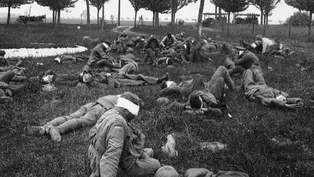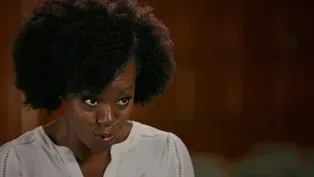Finding Your Roots
The Hidden Truth in Viola Davis' Family Tree
Clip: Season 9 Episode 5 | 10m 16sVideo has Closed Captions
Viola Davis and Prof. Gates discover a surprising secret her grandfather kept to himself.
Viola Davis and Professor Henry Louis Gates, Jr. dive into her family's past, and with the help of DNA and local records, discover a surprising secret her grandfather kept to himself. Viola Davis is a critically-revered, award-winning actress, producer, and New York Times Best-Selling Author. She is the first black actress to win two Tony Awards, an Oscar an Emmy and a Grammy.
Problems with Closed Captions? Closed Captioning Feedback
Problems with Closed Captions? Closed Captioning Feedback
Corporate support for Season 11 of FINDING YOUR ROOTS WITH HENRY LOUIS GATES, JR. is provided by Gilead Sciences, Inc., Ancestry® and Johnson & Johnson. Major support is provided by...
Finding Your Roots
The Hidden Truth in Viola Davis' Family Tree
Clip: Season 9 Episode 5 | 10m 16sVideo has Closed Captions
Viola Davis and Professor Henry Louis Gates, Jr. dive into her family's past, and with the help of DNA and local records, discover a surprising secret her grandfather kept to himself. Viola Davis is a critically-revered, award-winning actress, producer, and New York Times Best-Selling Author. She is the first black actress to win two Tony Awards, an Oscar an Emmy and a Grammy.
Problems with Closed Captions? Closed Captioning Feedback
How to Watch Finding Your Roots
Finding Your Roots is available to stream on pbs.org and the free PBS App, available on iPhone, Apple TV, Android TV, Android smartphones, Amazon Fire TV, Amazon Fire Tablet, Roku, Samsung Smart TV, and Vizio.
Buy Now

Explore More Finding Your Roots
A new season of Finding Your Roots is premiering January 7th! Stream now past episodes and tune in to PBS on Tuesdays at 8/7 for all-new episodes as renowned scholar Dr. Henry Louis Gates, Jr. guides influential guests into their roots, uncovering deep secrets, hidden identities and lost ancestors.Providing Support for PBS.org
Learn Moreabout PBS online sponsorship- [Henry] I started with Viola.
She was born on a plantation in South Carolina, where her mother's family had lived for generations.
And she still feels a deep tie to the place, even though she didn't stay there long.
So when someone asks you, Viola Davis, who are your people, where do you come from?
What do you say?
- I always say I came from Singleton Plantation, in St. Matthews, South Carolina.
I was born in my grandmother's sharecropper's house, and that's usually it.
I, it stops there.
I mean, once we moved to Rhode Island, when I was two months old, I, sort of, lost that connection to my family in the South.
- So, you don't think of yourself as a native of Rhode Island?
Though you spent so much time there.
You went to school there.
- Yeah, I would call that my home.
But it's interesting that, when I talk about where my home, I always talk about where I was born.
- [Henry] Right.
- And I think the disconnect from Rhode Island is just the black side of me going, ah, it was just hard integrating - Absolutely.
- into that culture.
So then, I always revert back to my birth.
- Yeah.
And where your people are from.
- The purest form, yeah.
- [Henry] While Viola may feel bonded to her mother's people, she knew very little about their lives.
We focused first on her mother's parents, Henry and Mozell Logan.
They were both born in St. Matthews, South Carolina.
And we found them in the town's archives, in the year 1942, making a very significant decision.
- Signatures of contracting parties.
Henry Logan, Mozell Howell - [Henry] That's your grandparents' marriage certificate.
What's it like to see that?
- Awesome.
I mean, you know, people that made you who you are, like, you wouldn't be born, - [Henry] Yeah.
- If it weren't for them.
- That's right.
- And yet, you don't really know them.
Then, all of a sudden, you're seeing it, right there.
It's pretty incredible.
- They were married on September 19th, 1942.
Henry was 22, your grandmother, Mozell, was just 15.
- Same age as my mom and dad.
- [Henry] Yep.
- When they got married.
- [Henry] That's right.
Same spread.
- [Viola] Wow.
- [Henry] The Logans were married for 37 years, and had at least 18 children together.
But, as we scoured the records that they left behind, we noticed something unusual, a secret that Viola's grandfather, Henry, had largely kept to himself.
In his social security application, filed in the early 1940s, Henry's father is listed as being a man named Gable Logan.
But when Henry passed away in 1979, his obituary said something very different.
- He was a son of the late John Young and Mrs. Corine Ravenel Logan.
Oooh.
- Mm-hmm.
- Ooh.
- Well, according to this obituary, Henry's father was a man named John Young, not Gable Logan.
Did your mom ever talk about this?
- Never.
- Mm.
Isn't that interesting, that silence?
- Silence is always interesting to me.
- [Henry] Records show that Henry's mother, Corinne, married Gable Logan in 1912, and that they were still married when Henry was born in May of 1920.
But, of course, that doesn't prove that Gable was Henry's father.
So, we set out to see what else we could learn about Gable and Corine, and we found a surprise.
Could you please turn the page?
- Oh, Corine, what are you doing?
- Viola?
This record is dated July 18th, 1919.
Would you please read the transcribed section?
- Passenger list of colored casuals returning to the United States, port of departure, Brest, France, to Camp Mills, New York.
Arrived July 18th, 1919.
Name: Logan, Gable.
Address: St. Matthews, South Carolina.
- [Henry] Any idea what you're looking at?
- He must have served during, this would be World War I, right?
- That's right.
That's a list of black soldiers returning, from serving in France, during World War I, and Gable Logan was on that ship, did you know?
- No.
Nobody talks about that.
- Right.
- [Viola] Yeah.
- Well, it's certainly possible that Gable got off the ship, and went home to his wife, and conceived your grandfather.
However, there's just one problem.
Do you see where the men on this ship were headed?
They're coming back to Camp Mills.
- [Viola] Camp Mills?
Yep.
I see it right there, Camp Mills, yeah.
- Gable got off his ship, and went to a military base in Long Island, New York.
- Oh.
- And we found no evidence that he ever went back to South Carolina.
- Wow.
- So, what do you think happened?
- I think Corine, uh, I don't know, got bored, had a disconnect, and, um, went with someone else while he was away, and- I think that that was a very short-lived relationship.
- [Henry] Viola's theory was seemingly supported by the 1920 census for South Carolina, where we saw Corine living with her parents, just four doors away from a familiar name.
- John Young, bing!
Head, black, age: 35, married.
Ooh.
Occupation: farmer.
Josephine: wife, black, age: 27.
- [Henry] Recognize any names there?
- Yeah.
John Young.
- [Henry] What's it like to see that?
- It's like, life, you know?
It's people getting with other people who are married.
It's the mess of relationships, and the mess of, you know, love, sex, - [Henry] Mm-hmm.
- Um, yeah, it's truth.
- Lu- lust.
- Yep.
Lust, desire.
- Yeah.
- [Henry] At this point, it seemed quite likely that Henry's father was John Young, and not Gable Logan.
But we had to be certain.
So, we turned to DNA.
Since Viola's mother is one generation closer to Henry, we asked her to take a DNA test.
We then compared her genetic profile, to millions of other profiles in publicly available databases.
And we saw that she had no matches to anyone in the extended Logan family.
Meaning that Henry definitely was not Gable's son.
But that still left us with a question.
Now, of course, the fact that Gable wasn't Henry's father does not mean that John Young was.
- Exactly.
- [Henry] So we returned to the DNA databases, and immediately noticed a cluster of matches that were all related to your mother, through one couple.
And based on the amount of DNA that your mother shares with the descendants of that couple, we confirmed that they were your mother's great-grandparents, biologically, genetically linked to your mother, through one of their children.
In fact, a son, to be exact.
- Wow.
- [Henry] That son is Henry's father.
And that son is your mother's biological grandfather.
You wanna meet him?
- Yes, absolutely.
- Could you please turn the page?
Viola, would you please read the name in the box, with a yellow border, on the chart in front of you?
- John Young.
- [Henry] John Young.
- Yeah.
Wow.
It makes me know that I entered this world with a big old load, from the moment I came out of my mother's womb.
- Right.
- I'm the amalgamation of a lot of stories, and a lot of secrets.
- [Henry] The truth of Henry's paternity likely stayed hidden, in no small part because of the events that followed.
His mother, Corine died of tuberculosis in 1926, when Henry was just six years old.
And when we looked for his father, John Young, we found him in the 1930 census, living far from St. Matthews.
- [Viola] Charlotte City, North Carolina.
John Young, head, age: 46.
Occupation: janitor, apartment, house.
Josephine: wife.
Age: 37.
John Junior: son.
Age: eight.
Place of birth: South Carolina.
Julius: son, age: four.
Place of birth: South Carolina.
- Mm.
Sometime between 1926 and 1930, John Young, his wife, Josephine, and their two young sons, your grandfather's half-brothers, - Yeah.
- moved from St. Matthews, to Charlotte, North Carolina.
Do you think that John's relationship with Corine may have had something to do with this move?
- Oh, absolutely.
You know, you got to, you got to bury your secrets.
- That's right.
Can't be living four doors away from that heifer.
I can hear that conversation.
"Huh?
You don't think I know?
Look at that baby, that baby look just like you!"
How do you imagine Henry felt, his mother dies, and then his father, his biological father, moves away.
- Abandoned.
- Yeah.
- And he was probably labeled unwanted.
- [Henry] That's right.
- Yeah.
- What's it like to learn all this?
To see all this?
- I think that all of us want to create a past that benefits us, and our fantasies.
- [Henry] Yes.
- I think, because the other is too hard to process.
Mm-hmm.
We like stories that are going to elevate us.
- [Henry] Right.
- You know, um, we're not so good with messy truth.
- [Henry] No.
- And, uh, this is a messy truth.
Brian Cox's Grandfather Was Exposed to Poison Gas in WWI
Video has Closed Captions
Clip: S9 Ep5 | 4m 25s | Brian Cox learns that his grandfather was likely exposed to poison gas in WWI. (4m 25s)
Video has Closed Captions
Preview: S9 Ep5 | 32s | Henry Louis Gates, Jr. traces the roots of actors Brian Cox and Viola Davis. (32s)
Providing Support for PBS.org
Learn Moreabout PBS online sponsorshipSupport for PBS provided by:



















